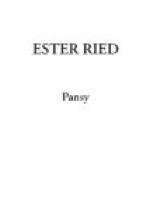There was one more scene for Ester to endure that day. Late in the afternoon, as she went to the closed room, there was bending over the manly form a gray-haired old woman. By whose friendly hands she had been permitted to enter, Ester did not stop to wonder. She had seen her but once before, but she knew at a glance the worn, wrinkled face; and, as if a picture of the scene hung before her, she saw that old, queer form, leaning trustfully on the strong arm, lying nerveless now, being carefully helped through the pushing throng—being reverently cared for as if she had been his mother; and she, looking after the two, had wondered if she should ever see them again. Now she stood in the presence of them both, yet what an unmeasurable ocean rolled between them! The faded, tearful eyes were raised to her face after a moment, and a quivering voice spoke her thoughts aloud, rather than addressed any body. “He gave his life for poor old useless me, and it was such a beautiful life, and was needed, oh so much; but what am I saying, God let it be him instead of me, who wanted so to go—and after trusting him all along, am I, at my time of life, going to murmur at him now? He came to see me only yesterday”—this in a more natural tone of voice, addressed to Ester—“he told me good-by. He said he was going a long journey with his wife; and now, may the dear Savior help the poor darling, for he has gone his long journey without her.”
Ester waited to hear not another word. The heavy sense of pain because of Abbie, which she had carried about with her through all that weary day, had reached its height with that last sentence: “He has gone his long journey without her.”
She fled from the room, up the stairs, to the quiet little chamber, which had been given to her for her hours of retirement, locked and bolted the door, and commenced pacing up and down the room in agony of soul.
It was not all because of Abbie that this pain knocked so steadily at her heart, at least not all out of sympathy with her bitter sorrow. There was a fearful tumult raging in her own soul; her last stronghold had been shattered. Of late she had come to think that Abbie’s Christian life was but a sweet reflection of Mr. Foster’s strong, true soul; that she leaned not on Christ, but on the arm of flesh. She had told herself very confidently that if she had such a friend as he had been to Abbie, she should be like her. In her hours of rebellion she had almost angrily reminded herself that it was not strange that Abbie’s life could be so free from blame; she had some one to turn to in her needs. It was a very easy matter for Abbie to slip lightly over the petty trials of her life, so long as she was surrounded and shielded by that strong, true love. But now, ah now, the arm of flesh had faltered, the strong staff had broken, and broken, too, only a moment, as it were, before it was to have been hers in name as well as in spirit. Naturally, Ester had expected




